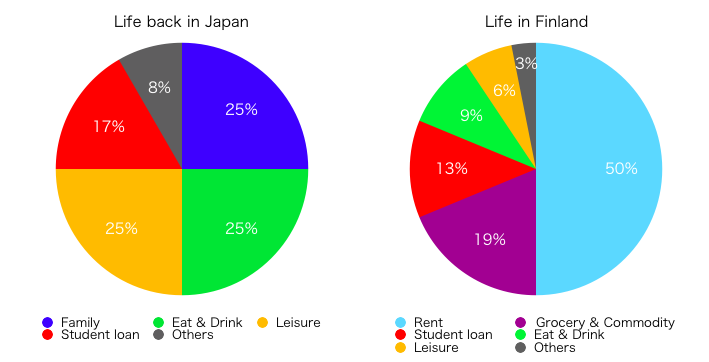How should we spend money?
Nowadays we can find a variety of webpages, books, or seminars featuring how to make money but it seems that there are not many contents that features how to spend money.
We don’t usually learn it at school nor often ask others about it but I started wondering how people spend money in different ways and what would be the good ways to spend money.
I found this article that tells one example of how an American lady spent money over a week.
This article shows that people obviously spend money in millions of ways. Thus, in this blog post, I first want to show the brief analysis on my money expense and then focus on how we should spend our extra money for a happier life.
Table of Contents
1. Comparison of my expenditure in Japan and Finland
These are graphs show how I spent money when I was in Japan and how I spend it now in Finland. The denominator here is sum for expenses in a month so it doesn’t include money saved.
As you can see, half of my monthly expenses were for socialisation, hobbies and leisure (Eat & Drink, Leisure in the graph) when I was in Japan. I lived with my family so I paid some amount to my family to cover food and cost of living, but still that wasn’t much. I was spending quite much money for my own pleasure.
On the other hand, in my life here in Finland, nearly 70% of my expenditure goes to cost of living (Rent, Grocery & commodity in the graph) which I have to spend every month. Also, while Japan has more options of entertainment you can easily spend money for, Finland has more options to enjoy daily life for cheaper price or even free, such as hiking, ice skating, sauna, and so on. For these reasons, the proportion of ‘Eat & Drink and Leisure’ to the total expenditure are quite low.
Like this, there is a clear difference in a way of spending money. Then, can I somehow make a small change in how I spend money to make life a bit more better?
Now let’s focus on basic questions. What should we spend money for? How could we affect our level of happiness or life satisfaction by spending money?
We could get hints from scientific research.
2. Hints on spending money
2. 1. Spend money on experience
Shopping is fun. I never think that buying material items is unnecessary as there are actually many material items that give you joy or make your life easier.
However, we should probably know the finding from San Francisco State University that people were more likely to feel happier and more satisfied with how money was spent when they spent money on experiences rather than ‘things’.
Experiences here are varied but I think we could see them as investment in yourself.
(Examples)
- Traveling
- Gym training instructed by a personal trainer
- Visiting Museums
- Attending hobby groups/workshops/seminars
- Taking online courses you are interested in
As for my own experience, buying museum card (Museokortti), which allows you to visit many museums in Finland as many times as you want, was one of the best investments ever.
Also as a side note, spending money on trips might be a good way to bring more happiness in an interesting way. According to the research, the largest boost in happiness level happens when you plan a trip and the effect lasted up to 8 weeks.
I don’t want to deny the idea of spending money on material items because shopping itself can be good experience as well depending on our ingenuity.
Let’s suppose you like cooking and need to buy a new good frying pan. If you just go to a shop and buy the random one without paying attention, it will be a normal shopping. However, if you do some research beforehand, go to a shop, take a look at various models, get some advice from sales staff, choose one you like, and try some new recipes with the pan, then the whole process could be good experience.
2.2. Spend money on others
This is something many of us are doing on a daily basis in various ways, such as giving a birthday present, celebrating someone’s graduation, getting coffee for your colleague, donation, etc…
According to researchers at the Harvard Business School and the University of British Columbia, in the series of studies, individuals who spend money on others showed significantly greater happiness compared to those who spent on themselves.
The research shows that money buys happiness if you spend “pro-socially” and how people spend their money is at least as important as how much money they make.
In addition to things like gifts for others or charitable donations, there are other unique ways to spend money on others which I think is cool and informative.
For example, investment on startups that aim to make positive impacts on society is a great way to activate economic society. Also, some people support artisans who inherit traditional culture or artists with different roles. I think that people who spend money on these purposes should be appreciated.
This is the TED talk by Michael Norton, one of the researchers of this study.
2.3. Use money to buy time
Time is money. Then why don’t you spend money to buy time?
Researchers at the University of British Columbia and the Harvard Business School are challenging a famous proverb that money can’t buy happiness.
The study clearly shows that individuals who spend money to buy free time, such as paying to delegate household chores like cleaning and cooking, is linked to greater life satisfaction.
This seems to be especially important to parents who have kids since there is still an age-old way of thinking that people should do everything by themselves when it comes to parenting. Also, some people might feel that they are being lazy if we they hire a housecleaner or childcare person at home.
However, the research results suggest that buying time has similar benefits for happiness as having more money.
This research focuses more on spending money on ‘time-saving services’ but how else can we use money to buy time?
One way is spending a bit more money for means of transportation to buy time. For example, you would be able to get time to do your own work with laptop or read comfortably by choosing a train rather than a long-distance bus with limited space. Please comment if you have any other ideas.
3. An extreme example
Lastly, I’d like to introduce one extreme example of spending money.
A Japanese billionaire, Yusaku Maezawa, revealed his plan to give away more than $9 million to 1,000 people on Twitter with the aim of seeing if it improves their happiness and how impact a million yen could have on a person’s life.
Lucky winners can use the money “as they like” and will be asked to answer regular questionnaires about how they’re using it. After that, he will ask social scientists to help analyze the results of the experiment. This is how he spends money on others and also to conduct “serious social trial”.
On a side note, Maezawa became more widely known abroad in 2019 when he bought a ticket to the moon trip planned for 2023 and it was offered by SpaceX led by another famous billionaire, Elon Musk. This is another ultimate way to spend money on experience.
References
Nawijn, J., Marchand, M.A., Veenhoven, R. et al. Vacationers Happier, but Most not Happier After a Holiday. Applied Research Quality Life 5, 35–47 (2010) doi:10.1007/s11482-009-9091-9
Pchelin, Paulina & Howell, Ryan. (2014). The hidden cost of value-seeking: People do not accurately forecast the economic benefits of experiential purchases. The Journal of Positive Psychology. 9. 322-334. 10.1080/17439760.2014.898316.
University of British Columbia. (2008, March 21). Money Buys Happiness When You Spend On Others, Study Shows. ScienceDaily. Retrieved January 15, 2020 from www.sciencedaily.com/releases/2008/03/080320150034.htm
Whillans, Ashley & Dunn, Elizabeth & Smeets, Paul & Bekkers, Rene & Norton, Michael. (2017). Buying time promotes happiness. Proceedings of the National Academy of Sciences of the United States of America. 114. 10.1073/pnas.1706541114.
https://news.ubc.ca/2017/07/24/using-money-to-buy-time-linked-to-increased-happiness/
https://www.bbc.com/news/world-asia-51086635


